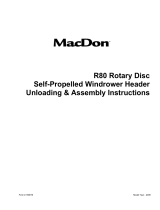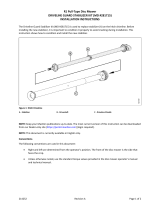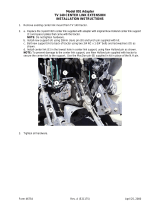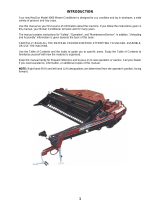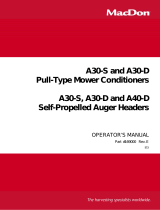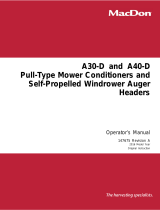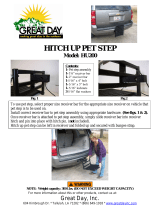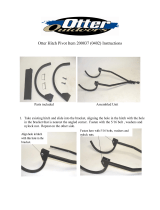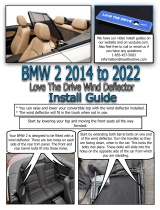Page is loading ...

Form # 169080 Model Year - 2009
R80 Pull-Type
Rotary Disc Mower Conditioner
Unloading & Assembly Instructions

Form # 169080 Model Year - 2009
R80 PULL-TYPE ROTARY DISC MOWER CONDITIONER

Form # 169080 Model Year - 2009
1
INTRODUCTION
This instruction describes the unloading, set-up and pre-delivery requirements for the Model R80 Pull-Type
Rotary Disc Mower Conditioner. Use the table of contents to guide you to specific areas.
CAREFULLY READ ALL THE MATERIAL PROVIDED BEFORE ATTEMPTING TO UNLOAD, ASSEMBLE, OR
USE THE MACHINE.
TABLE OF CONTENTS
INTRODUCTION........................................................................................................................................................1
GENERAL SAFETY...................................................................................................................................................2
RECOMMENDED TORQUES ...................................................................................................................................4
A. GENERAL...........................................................................................................................................................4
B. SAE BOLTS ........................................................................................................................................................4
C. METRIC BOLTS..................................................................................................................................................4
D. HYDRAULIC FITTINGS......................................................................................................................................5
CONVERSION CHART.............................................................................................................................................. 6
ACCRONYMS AND ABBREVIATIONS ..................................................................................................................... 7
STEP 1. UNLOAD ARTICULATING POWER TONGUE (APT) ............................................................................. 8
STEP 2. UNLOAD HEADER ..................................................................................................................................9
STEP 3. INSTALL GAUGE ROLLERS OR ADJUSTABLE SHOES – 16 FT ONLY............................................10
STEP 4. LOWER MOWER CONDITIONER.........................................................................................................12
STEP 5. REMOVE SHIPPING CHANNELS AND BLOCKING ............................................................................13
STEP 6. REMOVE FORMING SHIELD................................................................................................................14
STEP 7. UNPACK APT ........................................................................................................................................15
STEP 8. ATTACH APT.........................................................................................................................................17
STEP 9. CONNECT LIFT HOSE..........................................................................................................................18
STEP 10. CONNECT WIRING HARNESS.............................................................................................................18
STEP 11. INSTALL HYDRAULIC MOTOR ............................................................................................................19
STEP 12. INSTALL WHEELS ................................................................................................................................20
STEP 13. INSTALL CENTER LINK........................................................................................................................21
A. MECHANICAL LINK..........................................................................................................................................21
B. HYDRAULIC LINK ............................................................................................................................................21
STEP 14. REMOVE BANDING AT LIFT CYLINDERS ..........................................................................................21
STEP 15. ATTACH MOWER CONDITIONER TO TRACTOR............................................................................... 22
A. DRAWBAR TYPE HITCH .................................................................................................................................22
B. 3-POINT HITCH (Cat. II, III, or IIIN) ..................................................................................................................25
STEP 16. ATTACH HYDRAULICS AND ELECTRICAL.........................................................................................28
STEP 17. INSTALL STEERING CYLINDER..........................................................................................................29
STEP 18. FILL LIFT CYLINDERS..........................................................................................................................30
STEP 19. INSTALL FLOAT SPRINGS...................................................................................................................31
STEP 20. INSTALL FORMING SHIELD.................................................................................................................32
A. INSTALL SUPPORTS.......................................................................................................................................32
B. INSTALL FORMING SHIELD............................................................................................................................32
STEP 21. INSTALL TALL CROP FEED PLATES .................................................................................................. 34
STEP 22. INSTALL OPTIONS ...............................................................................................................................36
A. TALL CROP DIVIDER KIT ................................................................................................................................36
B. SHOE LIFT KIT.................................................................................................................................................36
STEP 23. LUBRICATE THE MOWER CONDITIONER .........................................................................................37
STEP 24. PERFORM PRE-DELIVERY CHECKS..................................................................................................42
A. DRIVE BELTS...................................................................................................................................................42
B. CONDITIONER ROLLS ....................................................................................................................................44
C. LIGHTS .............................................................................................................................................................45
D. MANUALS.........................................................................................................................................................45
E. RUN-UP THE MOWER CONDITIONER...........................................................................................................46

Form # 169080 Model Year - 2009
2
GENERAL SAFETY
CAUTION
The following are general farm safety
precautions that should be part of your
operating procedure for all types of machinery.
• Protect yourself.
• When assembling, operating and servicing
machinery, wear all the protective clothing
and personal safety devices that COULD be
necessary for the job at hand. Don't take
chances.
• You may need:
o a hard hat.
o protective shoes with slip resistant
soles.
o protective glasses or goggles.
o heavy gloves.
o wet weather gear.
o respirator or filter mask.
o hearing protection. Be aware that
prolonged exposure to loud noise can
cause impairment or loss of hearing.
Wearing a suitable hearing protective
device such as ear muffs (A) or ear
plugs (B) protects against objectionable
or loud noises.
• Provide a first-aid kit for use in case of
emergencies.
• Keep a fire extinguisher on the machine. Be
sure the extinguisher is properly maintained
and be familiar with its proper use.
• Keep young children away from machinery at
all times.
• Be aware that accidents often happen when
the operator is tired or in a hurry to get
finished. Take the time to consider the safest
way. Never ignore warning signs of fatigue.
• Wear close-fitting clothing
and cover long hair. Never
wear dangling items such as
scarves or bracelets.
• Keep hands, feet, clothing
and hair away from moving
parts. Never attempt to clear
obstructions or objects from
a machine while the engine
is running.
• Keep all shields in place. Never alter or
remove safety equipment. Make sure driveline
guards can rotate independently of the shaft
and can telescope freely.
• Use only service and repair parts made or
approved by the equipment manufacturer.
Substituted parts may not meet strength,
design, or safety requirements.
• Do not modify the machine. Unauthorized
modifications may impair the function and/or
safety and affect machine life.
(continued next page)
A
B

Form # 169080 Model Year - 2009
3
• Stop engine and remove key from ignition
before leaving operator's seat for any
reason. A child or even a pet could engage
an idling machine.
• Keep the area used for servicing machinery
clean and dry. Wet
or oily floors are
slippery. Wet spots
can be dangerous
when working with
electrical
equipment. Be
sure all electrical
outlets and tools
are properly
grounded.
• Use adequate light
for the job at hand.
• Keep machinery clean. Do not allow oil or
grease to accumulate on service platforms,
ladders or controls. Clean machines before
storage.
• Never use gasoline, naphtha or any volatile
material for cleaning purposes. These
materials may be toxic and/or flammable.
• When storing machinery, cover sharp or
extending components to prevent injury
from accidental contact.

Form # 169080 Model Year - 2009
4
RECOMMENDED TORQUES
A. GENERAL
• Tighten all bolts to the torques specified in
chart unless otherwise noted throughout
this manual.
• Check tightness of bolts periodically, using
bolt torque chart as a guide.
• Replace hardware with the same strength
bolt.
• Torque figures are valid for non-greased or
non-oiled threads and heads unless
otherwise specified. Do not grease or oil
bolts or capscrews unless specified in this
manual. When using locking elements,
increase torque values by 5%.
B. SAE BOLTS
NC BOLT TORQUE*
SAE 5 SAE 8
BOLT
DIA. "A"
in.
lbf·ft N·m lbf·ft N·m
1/4 9 12 11 15
5/16 18 24 25 34
3/8 32 43 41 56
7/16 50 68 70 95
1/2 75 102 105 142
9/16 110 149 149 202
5/8 150 203 200 271
3/4
265 359
365 495
7/8 420 569 600 813
1 640 867 890 1205
* Torque categories for bolts and capscrews are identified by
their head markings.
C. METRIC BOLTS
NC BOLT TORQUE*
8.8 10.9
BOLT
DIA. "A"
lbf·ft N·m lbf·ft N·m
M3 0.4 0.5 1.3 1.8
M4 2.2 3 3.3 4.5
M5 4 6 7 9
M6 7 10 11 15
M8 18 25 26 35
M10 37 50 52 70
M12 66 90 92 125
M14 103 140 148 200
M16 166 225 229 310
M20 321 435 450 610
M24 553 750 774 1050
M30 1103 1495 1550 2100
M36 1917 2600 2710 3675
* Torque categories for bolts and capscrews are identified by
their head markings.
SAE-5 SAE-8

Form # 169080 Model Year - 2009
5
D. HYDRAULIC FITTINGS
FLARE TYPE
a. Check flare and flare seat for defects that
might cause leakage.
b. Align tube with fitting before tightening.
c. Lubricate connection and hand tighten swivel
nut until snug.
d. To prevent twisting the tube(s), use two
wrenches. Place one wrench on the connector
body and with the second tighten the swivel
nut to the torque shown.
TORQUE
VALUE*
RECOMMENDED
TURNS TO TIGHTEN
(AFTER FINGER
TIGHTENING)
TUBE
SIZE
O.D.
(in.)
NUT SIZE
ACROSS
FLATS
(in.)
lbf·ft N·m Flats Turns
3/16 7/16 6 8 1 1/6
1/4 9/16 9 12 1 1/6
5/16 5/8 12 16 1 1/6
3/8 11/16 18 24 1 1/6
1/2 7/8 34 46 1 1/6
5/8 1 46 62 1 1/6
3/4 1-1/4 75 102 3/4 1/8
7/8 1-3/8 90 122 3/4 1/8
* The torque values shown are based on lubricated connections
as in reassembly.
O-RING TYPE
a. Inspect O-ring and seat for dirt or obvious defects.
b. On angle fittings, back off the lock nut until washer
(A) bottoms out at top of groove (B) in fitting.
c. Hand tighten fitting until back up washer (A) or
washer face (if straight fitting) bottoms on part
face (C) and O-ring is seated.
d. Position angle fittings by unscrewing no more than
one turn.
e. Tighten straight fittings to torque shown.
f. Tighten angle fittings to torque shown in the
following table while holding body of fitting with a
wrench.
TORQUE
VALUE*
RECOMMENDED
TURNS TO TIGHTEN
(AFTER FINGER
TIGHTENING)
THD
SIZE
(in.)
NUT SIZE
ACROSS
FLATS
(in.)
lbf·ft N·m Flats Turns
3/8 1/2 6 8 2 1/3
7/16 9/16 9 12 2 1/3
1/2 5/8 12 16 2 1/3
9/16 11/16 18 24 2 1/3
3/4 7/8 34 46 2 1/3
7/8 1 46 62 1-1/2 1/4
1-1/16 1-1/4 75 102 1 1/6
1-3/16 1-3/8 90 122 1 1/6
1-5/16 1-1/2 105 142 3/4 1/8
1-5/8 1-7/8 140 190 3/4 1/8
1-7/8 2-1/8 160 217 1/2 1/12
* The torque values shown are based on lubricated connections as
in reassembly.
FLARE
FLARESEAT
BODY
NUT
LOCKNUT
SEAT
WASHER
O-RING
GROOVE
FITTING
A
B
C

Form # 169080 Model Year - 2009
6
CONVERSION CHART
INCH-POUND UNITS SI UNITS (METRIC)
QUANTITY
UNIT NAME ABBR.
FACTOR
UNIT NAME ABBR.
Area acres acres x 0.4047 = hectares ha
Flow US gallons per minute (gpm) x 3.7854 = liters per min L/min
Force pounds force lbf x 4.4482 = Newtons N
inch in. x 25.4 = millimeters mm
Length
foot ft x 0.305 = meters m
Power horsepower hp x 0.7457 = kilowatts kW
x 6.8948 = kilopascals kPa
Pressure pounds per square inch psi
x .00689 = megapascals MPa
pound feet or foot pounds lbf·ft or ft·lbf x 1.3558 = newton meters N·m
Torque
pound inches or inch pounds lbf·in. or in·lbf x 0.1129 = newton meters N·m
Temperature degrees Fahrenheit ˚F (F- 32) x 0.56 = Celsius ˚C
feet per minute ft/min x 0.3048 = meters per min m/min
feet per second ft/s x 0.3048 = meters per sec m/s
Velocity
miles per hour mph x 1.6063 = kilometers per hour km/h
US gallons US gal. x 3.7854 = liters L
ounces oz. x 29.5735 = milliliters ml
Volume
cubic inches in.
3
x 16.3871 = cubic centimeters cm
3
or cc
Weight pounds lb x 0.4536 = kilograms kg

UNLOADING AND ASSEMBLY
Form # 169080 Model Year - 2009
7
ACCRONYMS AND
ABBREVIATIONS
TERM DEFINITION
API
American Petroleum Institute
APT
Articulating Power Tongue
ASTM
American Society Of Testing And
Materials
C
Celsius
F
Fahrenheit
ft/min feet per minute
ft/s feet per second
gpm U.S. gallons per minute
hp horsepower
in.
3
cubic inches
kPa
kilopascals
lbf
pounds force
lbf·ft or ft·lbf
pound feet or foot pounds
lbf·in or in·lbf
pound inches or inch pounds
mPa
megapascals
mph
miles per hour
N
newtons
N·m
newton meters
oz.
ounces
psi
pounds per square inch
PTO
Power Take-Off
rpm
Revolutions Per Minute
SAE
Society Of Automotive Engineers

UNLOADING AND ASSEMBLY
Form # 169080 Model Year - 2009
8
STEP 1. UNLOAD
ARTICULATING POWER
TONGUE (APT)
CAUTION
To avoid injury to bystanders from being
struck by machinery, do not allow persons
to stand in unloading area.
CAUTION
Equipment used for unloading must meet
or exceed the requirements specified
below. Using inadequate equipment may
result in chain breakage, vehicle tipping or
machine damage.
LIFTING VEHICLE
Min. Lifting Capacity 8000 lb. (3630 kg)
Min. Lifting Height 15 ft. (4.5 m)
CHAIN
Overhead Lifting Quality
(1/2 inch)
5000 lb. (2270 kg)
Min. Working Load
a. Remove hauler's tie down straps and chains.
b. Attach chain to two brackets on top of APT as
shown.
c. Adjust chain lengths so APT is lifted evenly.
d. Raise APT off deck, back up until unit clears
trailer and slowly lower to 6 inches (150 mm)
from ground.
IMPORTANT
Take care not to contact the other
machine if load is two-wide.
e. Take to storage or set-up area and set APT
down securely on level ground.
f. Repeat for second APT if required.
g. Check for shipping damage and missing parts.

UNLOADING AND ASSEMBLY
Form # 169080 Model Year - 2009
9
STEP 2. UNLOAD HEADER
CAUTION
To avoid injury to bystanders from being
struck by machinery, do not allow persons
to stand in unloading area.
CAUTION
Equipment used for unloading must meet
or exceed the requirements specified
below. Using inadequate equipment may
result in chain breakage, vehicle tipping or
machine damage.
LIFTING VEHICLE
Min. Lifting Capacity 8000 lb. (3630 kg)
Min. Lifting Height 15 ft. (4.5 m)
CHAIN
Overhead Lifting Quality
(1/2 inch)
5000 lb. (2270 kg)
Min. Working Load
WARNING
Be sure forks are secure before moving
away from load. Stand clear when lifting.
a. Remove hauler's tie down straps and chains.
b. Approach mower-conditioner from either its
"underside" or "topside" and slide forks in
underneath lifting framework as far as
possible.
NOTE
When possible, approach from the
underside to minimize potential for
scratching the unit.
c. Raise mower-conditioner off deck.
IMPORTANT
Take care not to contact the other machine
if load is two-wide.
d. Back up until unit clears trailer and slowly lower to
6 inches (150 mm) from ground.
e. Take to storage or set-up area set machine down
securely on level ground.
f. Repeat for other mower conditioner if required.
g. Check for shipping damage and missing parts.
FORKS

UNLOADING AND ASSEMBLY
Form # 169080 Model Year - 2009
10
STEP 3. INSTALL GAUGE
ROLLERS OR
ADJUSTABLE SHOES –
16 FT ONLY
If kits are not supplied, proceed to STEP 4,
LOWER MOWER CONDITIONER, otherwise
proceed as follows:
NOTE
These kits may be installed later in the
header assembly sequence but it may
be easier prior to laying the header
down.
I. GAUGE ROLLERS
a. Unpack gauge roller bundle.
b. Remove four clevis pins from roller assembly.
c. Position gauge roller assembly on frame and
secure with two clevis pins (A). Secure pins
with lynch pins.
NOTE
It may be necessary to make the following
adjustment to the roller assembly if there is
interference with the header frame:
1. Determine the amount of interference
between the roller assembly flanges (B) and
the frame brackets (C).
2. Unlock the locking collar (D) on each bearing.
3. Adjust the flanges (B) to accommodate the
interference.
4. Re-lock the bearings.
5. Install the roller assembly.
d. Adjust roller assembly to desired height and install
two clevis pins (E). Secure with lynch pins.
e. Repeat above steps for opposite side. Set both
gauge rollers to same position.
A
E
D
C
B

UNLOADING AND ASSEMBLY
Form # 169080 Model Year - 2009
11
II. SKID SHOES
a. Unpack skid shoe bundle.
b. Remove four clevis pins from skid shoe.
c. Position skid shoe on frame and secure with
two clevis pins (C). Secure pins with lynch
pins.
d. Adjust skid shoe to desired height and install
two clevis pins (D). Secure with lynch pins.
e. Repeat above steps for opposite side. Set
both skid shoes to same position.
C
D

UNLOADING AND ASSEMBLY
Form # 169080 Model Year - 2009
12
STEP 4. LOWER MOWER
CONDITIONER
a. Attach either a spreader bar or chain to forks.
CAUTION
Ensure spreader bar or chain is secured
to the forks so that it cannot slide off the
forks or towards the mast as the header
is lowered to the ground.
Chain Type
Overhead Lifting Quality
(1/2 Inch)
Min. Working Load 5000 lb. (2270 kg)
b. Drive lifting vehicle to approach header from its
"underside".
c. Attach chain hooks to hooks on either side of
header.
CAUTION
Stand clear when lowering the header.
NOTE
Do not lift at hooks when unloading from
trailer. This procedure is only for laying
the machine over into working position.
IMPORTANT
Chain length must be sufficient to
provide a minimum 4 feet (1.2 m) vertical
chain height.
d. Raise forks until lift chains are fully tensioned.
e. Back up SLOWLY while simultaneously lowering
machine until cutterbar rests on ground.
f. Remove chain from header.
NOTE
The front face of the carrier mast should be
approximately vertical for easier assembly
of the APT.
g. Remove chain from header.
MAST PERPENDICULAR
TO GROUND
ADJUST HEIGHT
AS REQUIRED
1
2
3

UNLOADING AND ASSEMBLY
Form # 169080 Model Year - 2009
13
STEP 5. REMOVE SHIPPING
CHANNELS AND
BLOCKING
a. Cut the banding on the shipping beam at the
rear of carrier frame and remove components
from inside the shipping beam.
NOTE
Hardware bag is for STEP 20. INSTALL
FORMING SHIELD.
b. Place LH spring assembly (heavy) near LH
side of carrier. Place RH spring assembly
(light) near RH side of carrier.
NOTE
The following steps remove the stand as
an assembly. These components may
also be removed individually.
c. Place blocks under the shipping beam at the
rear of the carrier frame.
d. Loosen the shipping stand bolt at the lower
end of each carrier frame leg.
e. Remove the bolt that secures shipping stand at
each float spring anchor.
f. Remove the support blocks and lower the
shipping stand to the ground.
g. Remove bolts at carrier frame legs and remove
shipping stand frame.
h. Cut banding that secures angles to carrier frame
tube and remove angles.

UNLOADING AND ASSEMBLY
Form # 169080 Model Year - 2009
14
STEP 6. REMOVE FORMING
SHIELD
a. Position lift forks with extensions under forming
shield at front of header.
b. Cut shipping wire and remove four bolts at
front edge of forming shield.
c. Cut shipping wire (2 places) on aft end of
forming shield at rear of header.
d. Manually slide forming shield onto lift forks.
e. Remove five bolts and nuts on each door and
remove front angles and lift hooks. Retain lower
side bolt (A) for re-installation at same location
after hook is removed.
WARNING
Ensure cutterbar is completely clear of foreign
objects. These objects can be ejected with
considerable force when the machine is
started and may result in serious injury or
machine damage.
f. Thoroughly check cutterbar area for wooden
blocking, banding, and hardware that may have
fallen between discs.
g. Cut plastic ties at end curtains and remove
creases in curtains.
h. Ensure that curtains hang properly and completely
enclose cutterbar area. Minor creases in curtains
will eventually straighten out.
A
ACCEPTABLE
NOT ACCEPTABLE

UNLOADING AND ASSEMBLY
Form # 169080 Model Year - 2009
15
STEP 7. UNPACK APT
a. Attach chain from lifting vehicle or hoist to APT
hooks, and raise it approximately 24 inches
(610 mm) off ground.
b. Cut banding securing hydraulic motor and
hoses to underside of APT.
CAUTION
Hold motor to keep it from dropping to the
ground when cutting band around motor.
c. Route motor and hoses to the left side of the
APT.
d. Secure the motor to the steering cylinder with
shipping wire.
e. Remove the two bolts securing wooden stand to
APT pin.
NOTE
Bolt and washer at top of pin keeps pin in
APT when bolts are removed.
f. Cut banding securing wooden stand to APT and
remove wooden stand.
(continued next page)

UNLOADING AND ASSEMBLY
Form # 169080 Model Year - 2009
16
g. Remove bolt and washer securing pin to APT.
CAUTION
Hold pin from falling to the ground when
bolt is removed.
h. Remove pin and reinsert pin in APT from top.
i. Remove four bolts securing shipping bracket at
front of APT, and remove bracket.
j. Remove banding from jack.
k. Remove pin (A) securing jack to APT and remove
jack from shipping position.
l. Install at jack location at front of APT and secure
with pin (A).
A
A

UNLOADING AND ASSEMBLY
Form # 169080 Model Year - 2009
17
STEP 8. ATTACH APT
CAUTION
Keep hands clear when lowering APT.
a. Remove the six bolts and nuts from frame and
retain for reinstallation.
b. Using a forklift or equivalent, manoeuvre APT
into position and install pivot pin (A) into
mower-conditioner frame.
NOTE
Use the jack to adjust the pitch of the
APT for proper alignment when installing
pivot pin.
NOTE
Pin may need to be tapped into final
position with a hammer due to the tight
clearances.
c. Secure pivot pin (A) to frame by installing six 5/8 x
1.75 long Gr. 8 bolts (C) with lock nuts removed at
step a. Install bolts with heads facing aft.
d. Torque to 250 ft-lbf (339 N·m).
e. Install bolt (B), lockwasher, and flatwasher
removed at STEP 7g. at lower end of pivot pin
and tighten bolt.
f. Position APT with jack so that rear span of APT is
approximately horizontal. Remove lifting chain
from APT.
g. Check oil level in site glass (D) on the left side of
the APT, is between ADD and FULL.
h. If necessary add single grade trans-hydraulic oil at
filler pipe (E).
RECOMMENDED OILS
Petro-Canada Duratran Chevron 1000 THF
Case IH Hy-Tran Plus® Agco Power Fluid 821XL
New Holland Hydraul Esso/Exxon Hydraul 56
Shell Donax TD John Deere Quatro® J20C
C
B
A
D
E
A

UNLOADING AND ASSEMBLY
Form # 169080 Model Year - 2009
18
STEP 9. CONNECT LIFT HOSE
IMPORTANT
Hoses should be routed so there are no
twists or sharp bends and no locations
where contact with the frame is likely.
Ensure that there is sufficient length of
hose and wiring in span to
accommodate full swing of APT in both
directions. Relocate plastic ties if
necessary to provide suitable slack in
hoses and wiring.
IMPORTANT
To prevent contamination of the
hydraulic system, extreme care must be
taken to avoid dirt entering at connection
points. To minimize exposure to
contamination, remove cap from one
hose and its mating connection and
connect before removing other caps and
plugs.
a. Connect the lift cylinder hose (A) to the fitting
(B) on the APT.
STEP 10. CONNECT WIRING
HARNESS
b. Connect electrical wiring harness (C) at rear of
APT as shown.
c. On 16 ft. header connect light harness to
connector (E) at LH side of carrier frame.
A
B
C
E
/


